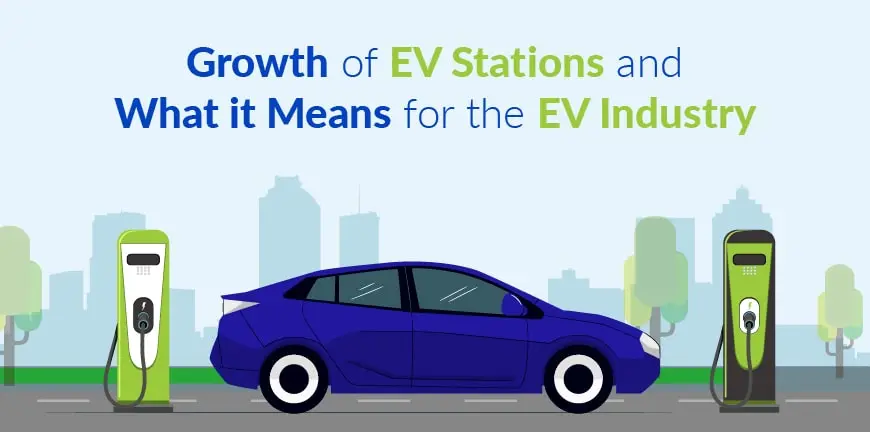
Top 10 Staffing Trends to Watch in 2026
24/09/2024
MSME Compliance: All You Need to Know
27/09/2024The automotive industry has seen some significant changes over the years. India’s public electric vehicle (EV) charging infrastructure expanded nearly ninefold from 1800 stations In February 2022 to 16,347 by March 2024. However, a report by Forvis Mazards reported that this growth comes with a myriad of challenges. The report projects that by 2030, India could have around 50 million EVs on its roads, requiring approximately 1.32 million charging stations. To meet this demand, the country will need to install about 400,000 chargers annually.
Solutions to Successfully Implement EV Stations
While this transformative journey can do wonders for the economy, there are quite a few hurdles like inadequate charging stations curbing the growth of electric vehicles. Better charging stations and rapid charging stations are essential to innovative battery stations.
The journey towards electrification, and its transformation of mobility, hinges on the implementation of EV charging networks through innovative renewable energy solutions and advanced battery technology.
1. Develop Charging infrastructure in remote and rural areas
While the India ministry has mandated a charging station every 25km on highways, for 11,596 stations, the implementation of the same is yet to be. The expansion of charging infrastructure to all areas is crucial for nationwide EV adoption in India. Some innovative solutions that could address the limited grid connectivity include solar-powered stations and mobile units
2. Effective partnerships and collaborations to enhance infrastructure
Building a robust EV charging network in India demands close collaboration among various stakeholders, including government bodies, private companies, and local communities.
Leveraging public-private partnerships can attract the necessary investments and expertise to drive infrastructure development. Strengthening existing partnerships between automakers, charging station providers, and regulatory authorities will further accelerate widespread, transformative progress.
3. Standardization of technology
Standardization of charging systems for better internal operational efficiency among various EV models is extremely important. To do so, you may use technology like fast charging, wireless charging, and vehicle-to-grid charging technology.
Additionally, implementing smart grid technology and energy storage solutions can balance electricity loads, store excess power during off-peak times for use during high-demand periods, and enhance the overall efficiency and reliability of the power grid.
These can help elevate EV charging infrastructure’s usability and accessibility.
4. Better Regulations and Policies
Policies and regulations that encourage EV adoption and support the rollout of charging infrastructure are crucial for developing a strong EV ecosystem. Measures such as tax breaks, low-interest loans for charging station installations, and mandatory EV charging requirements in building codes can significantly drive the expansion of EVs and related infrastructure. Government efforts to subsidize EV purchases or offer free or discounted charging can further speed up the transition to electric vehicles.
Government EV Initiatives in India
The Ministry of Heavy Industries recently approved 2,877 EV charging stations across various states along with 11,576 stations on 16 highways and 9 expressways.
Impact of Enhanced EV Infrastructure on Indian Mobility
The transition to EV can help mitigate pollution, and oil dependency and stimulate a myriad of economic opportunities. But to achieve this transition, India needs backing for pro-EV policies and substantial expansion of the EV charging infrastructure.
Some of the big advantages of Enhanced EVs are-
1. Better EV range allowing long-distance travel
The huge range of technological advancements can improve EV range capabilities, allowing EV owners to travel long distances without fear. With a distribution of charging points as required, the EV can see a lot more acceptance from the audience.
2. Implementation of a greater number of EV charging stations to offer better access to transportation
Expanding the network of EV charging stations across India improves charging convenience, reduces range anxiety, and encourages broader adoption of electric vehicles.
A well-developed charging infrastructure not only promotes EV usage but also drives growth in the e-mobility sector, advancing the shift toward a sustainable and eco-friendly transportation system.
3. Better innovation and tech development
Yes, the expansion of EV charging infrastructure is essential logistically, but it doesn’t stop there. It also helps companies to think about further innovation and discover technological breakthroughs in the EV industry.
How do Various Other Industries Implement and Benefit from EV Charging?
Once the decision has been made to invest in chargers, and possibly an electrified company fleet, businesses must set about selecting the kind of charger to install, and where and anticipate how far it can benefit them.
- For luxury hotels, shopping centers, or restaurants, matching the look and feel of customer chargers with their luxury branding is more important than for, say, fast-food chains or supermarkets. For example, shopping centers might want to position customer chargers near the main entrance to their public car park, and employee chargers near their respective entrances, to ensure smooth flows through the relevant entry points.
- In hotels, Access to the internet via WiFi is a minimum expected service for most customers, along with some others like free parking, gym access, and swimming pools. As EV becomes the norm, EV charging can become the new expectation for customers.
- For businesses like shopping centers, restaurants, concert halls, airports, and hotels, switching to an electrified company fleet has obvious cost and energy-efficiency benefits. Saving money and no longer being at the whim of petrol price fluctuations are just two examples of these advantages.
The Future Impact of EV on Indian Mobility
The Indian government recognizes the importance of sustainable transportation and is prioritizing the adoption of electric vehicles (EVs). However, the lack of adequate charging infrastructure poses a significant challenge to widespread EV adoption. Key obstacles include a shortage of charging stations, limited grid capacity, technological constraints, regulatory hurdles, and low public awareness.
Addressing these challenges will require coordinated efforts among stakeholders, standardization of charging protocols, innovative charging technologies, and the expansion of infrastructure into rural areas. Additionally, smart grid strategies, supportive policies, and advancements in battery technology and charging speeds are crucial.
By overcoming these barriers and establishing a robust EV charging network, India can transform its mobility landscape, reduce pollution, and stimulate economic growth for a sustainable future.
Contact Us For Business Enquiry

Rajkumar Shanmugam
Rajkumar Shanmugam is the Head of HR at ALP Consulting, bringing over 19 years of comprehensive HR leadership experience across India and international markets. His expertise spans talent acquisition, employee relations, performance management, compliance, and HR transformation. Rajkumar has a proven track record of driving people-centric initiatives, enhancing workplace culture, and aligning HR strategy with business goals. With extensive experience in US staffing operations and global mobility, he continues to lead organizational excellence through innovation and employee engagement.




